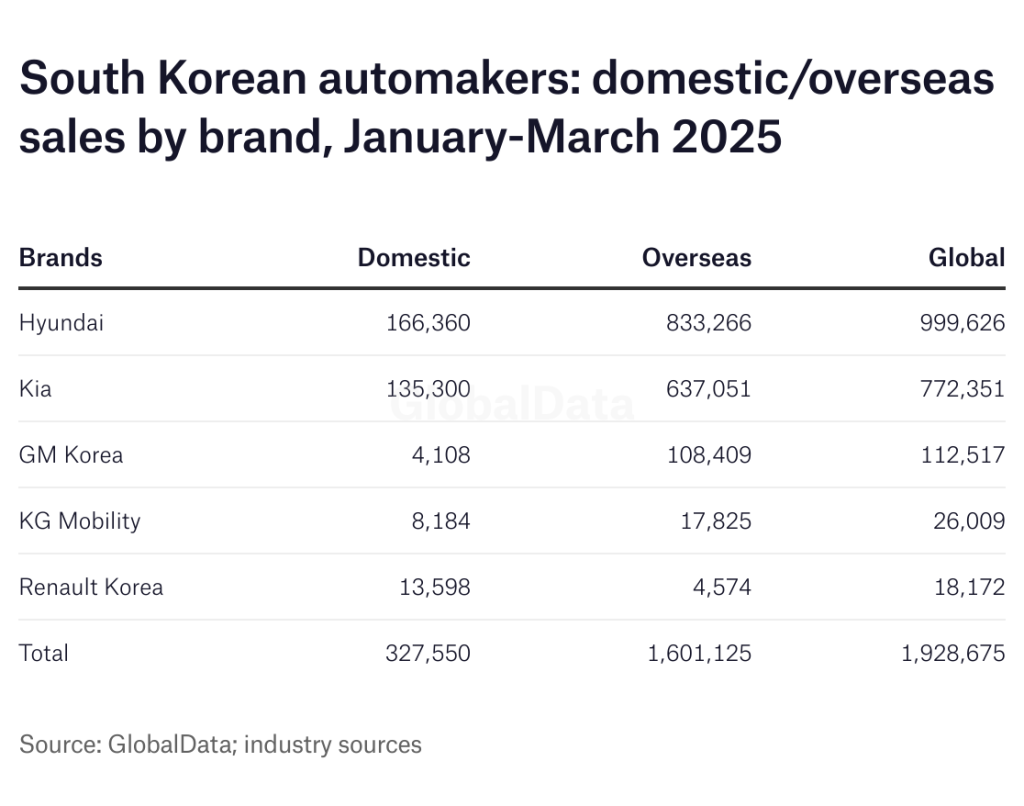
Domestic sales by South Korea’s five main automakers combined rose by 3% to 123,817 units in March 2025 from 120,289 units a year earlier, according to preliminary wholesale data released individually by the manufacturers. The data do not include sales by South Korea’s low-volume commercial vehicle manufacturers including Tata-Daewoo and Edison Motors, while import brands are covered in a separate report later in the month.
The domestic vehicle market last month continued to be driven by the recent roll-out of new products, particularly by the country’s largest automaker Hyundai. Overall demand in the country remains sluggish, however, due to high household debt and weak sentiment – with consumers spending less on durable goods. Corporate sentiment has also taken a hit due to uncertainty over US trade policies.

Discover B2B Marketing That Performs
Combine business intelligence and editorial excellence to reach engaged professionals across 36 leading media platforms.
The latest economic data show GDP growth slowed to 1.2% year-on-year in the fourth quarter of 2024, from 1.5% in the third quarter and 2.8% in the first half of last year. The central bank continued to cut its benchmark interest rate in February, to 2.75% from a peak of 3.5% in 2024, to help support domestic consumption.
In the first quarter of the year the country’s five main domestic vehicle manufacturers reported a 1.7% increase in domestic sales to 327,550 units combined, from 322,211 in the same period of last year. Hyundai drove the market higher in this period with sales rising by 4% to 166,360 units, while Kia’s sales fell by 2% to 134,412 units. GM Korea reported a 41% plunge to 4,108 units, while KG Mobility saw its sales drop by 33% to 8,184 units. Renault Korea’s sales surged by 150% to 13,598 units from depressed year-earlier levels, following the recent launch of the Geely-based Grand Koleos hybrid SUV.
Global sales by the country’s “big-five” automakers, including vehicles produced overseas, fell slightly to 1,928,675 units in the first three months of 2025 from 1,937,639 units a year earlier – reflecting slightly weaker overseas sales of 1,601,125 units compared with 1,614,679 previously.

Hyundai Motor’s global sales fell by 2% to 365,812 units in March 2025 from 373,290 a year earlier, as overseas sales continued to weaken while domestic sales improved slightly. Global sales in the first quarter of the year were just slightly lower at 999,626 units compared with 1,006,706 previously.
Domestic sales rose by 1% to 63,090 units last month from 62,504 a year earlier, with SUVs accounting for 22,433 units while sales by its luxury brand Genesis amounted to 10,592 units. First-quarter sales were up by 4% to 166,360 units from 159,967 a year earlier.
Overseas sales fell by 2.6% to 302,722 units in March from 310,786 units a year earlier, while year-to-date volumes were 1.6% lower at 833,266 from 846,739 units, supported by strong demand in North America while sales in India weakened. The company’s new EV plant in the US state of Georgia became operational last October, producing the Ioniq 5 followed by the Ioniq 9 earlier this year. A Kia model is also set to go into production in 2026. The automaker said it will expand capacity at the plant to 500,000 units per year later in the decade from 300,000 at present.
Hyundai has set a global sales target of 4,174,000 vehicles for 2025, including its Genesis luxury brand, representing a slight increase over 2024 volumes. This includes 710,000 domestic sales and 3,464,000 overseas sales. To achieve this goal, the company said it will focus “on strengthening its market competitiveness with a stronger range of electrified models, including hybrids and battery electric vehicles, and scaling up local production at its global manufacturing facilities.”
Kia’s global sales rose by just over 2% to 278,058 vehicles in March from 242,917 a year earlier, reflecting stronger domestic and overseas sales. Global sales last month were underpinned by strong demand for the recently-launched Sportage and Sorento SUVs, with 49,196 and 25,942 deliveries respectively, as well as growing demand for the EV3 model. First-quarter global sales rose by 1.6% to 772,351 units from 760,514 a year earlier.
Domestic sales rose by 2% to 50,006 last month from 49,006 units a year earlier, with the Sorento being its best-selling model with 10,155 domestic deliveries, followed by the Carnival MPV with 7,710 sales and the Sportage with 6,617 units. First-quarter domestic sales were still down by over 2% to 134,412 units from 137,622 a year earlier, reflecting a 14% decline in January. The company sold a further 888 special purpose vehicles (SPVs), up from 749 a year earlier, most of which were delivered to domestic clients.
Overseas sales increased by 2.2% to 227,724 units in March from 222,713 a year earlier and by 2.4% to 637,051 units year-to-date from 622,143 units, underpinned by an 11% rise in US sales to 198,850 units. The Sportage was the brand’s best-selling model overseas last month with 42,579 deliveries, including 16,872 in the US.
Kia is targeting a 4% increase in global sales to 3,216,200 units in 2025, including 550,000 domestic sales, 2,658,000 overseas and 8,200 SPV sales, supported by the recent launch of the new K4 and revamped K5 sedans and the Syros SUV in India. This year the company plans to roll out its new Tasman pickup truck, followed by the EV4 and EV5 BEVs. Its medium-term plan is to sell 4.3 million vehicles globally by 2030, including 1.6 million BEVs.
GM Korea’sglobal sales fell by 20% to 41,244 units in March from 51,388 units a year earlier, with domestic and overseas sales down sharply. Sales in the first quarter of the year dropped by 10% to 112,517 units from 125,212 units previously. The Trailblazer SUV and Trax crossover vehicle remain by far the company’s best-selling models, with most output shipped overseas.
Domestic sales continued to drop sharply last month, by over 31% to 1,397 units from 2,038 units a year earlier – including 1,097 units of the Trax models, resulting in a 41% plunge year-to-date to 4,108 units from 6,919 units – as the automaker struggled with rising competition from other domestic manufacturers and from importers.
Exports declined by 19% to 39,847 units in March from 49,350 a year earlier, with the Trax model accounting for 12,531 units, while first-quarter exports declined by over 8% to 108,409 from 118,293 units.
With around 85% of output shipped to the US last year, GM Korea’s CFO Paul Jacobson said the company may have to consider relocating its operations to the US if the recent US import tariff hikes become permanent.
KG Mobility’s (KGM) global sales fell by 11% to 9,483 units in March from 10,702 units a year earlier, reflecting weak domestic demand while overseas sales increased slightly. Total sales in the first quarter of the year were down by 11% to 26,009 from 29,326 a year earlier. The company, previously known as Ssangyong Motor, was acquired in late 2022 by a consortium led by local steel and chemicals firm KG Group.
Domestic sales plunged by 32% to 3,208 units last month from 4,702 a year earlier, resulting in a 33% drop to 8,184 units year-to-date from 12,212 units, as the automaker struggled to keep up with rising competition from other domestic manufacturers and from importers.
Overseas sales increased by almost 5% to 6,275 in March from 6,000 a year earlier, and by 4% to 17,825 units in the first quarter from 17,114 units, as the company continued to expand its global market coverage.
KGM plans to further expand its zero-emissions vehicle range, following the launch of a new minivan version of the Torres EVX battery-powered SUV last September. The company began taking orders for its new battery-powered Musso EV pickup at the end of February.
KGM has entered into a strategic partnership with China’s Chery Automobile Company, involving platform licensing and product sharing aimed at helping it strengthen its SUV line-up. The deal will also give KGM access to readily available new energy vehicle (NEV) technologies including vehicle platforms.
Renault Korea‘s global sales rose by 16% to 8,256 units in March from depressed year-earlier sales of 7,133 units, with plunging overseas sales more than offset by a sharp rebound in domestic sales from low year-earlier levels. In the first quarter of the year global sales were up by 14% to 18,172 units from 15,881 a year earlier.
Domestic sales tripled to 6,116 units last month from 2,039 units in the same month of last year, resulting in year-to-date sales surging by almost 150% to 13,598 from 5,491 units – reflecting the recent launch of the new Geely-based Grand Koleos hybrid SUV. The company recently restructured its assembly plant in Busan, resulting in more production being allocated for the local market, according to local reports.
Exports fell by 58% to 2,140 units in March from 5,094 a year earlier, resulting in a 56% plunge in the first quarter sales to 4,574 from 10,390 units – mostly comprising shipments of the Arkana hybrid crossover vehicle (a rebadged XM3).
Renault Korea last year confirmed it will continue to overhaul its product range with a strong focus on SUVs, BEVs and hybrid vehicles, starting with the launch of the new Geely-based Grand Koleos hybrid SUV last July and the phasing out of its aging SM6 mid-size sedan at the end of last year. The company recently agreed to produce the Geely Polestar 4 BEV at its Busan plant from the second half of 2025, for sale domestically and for export.






